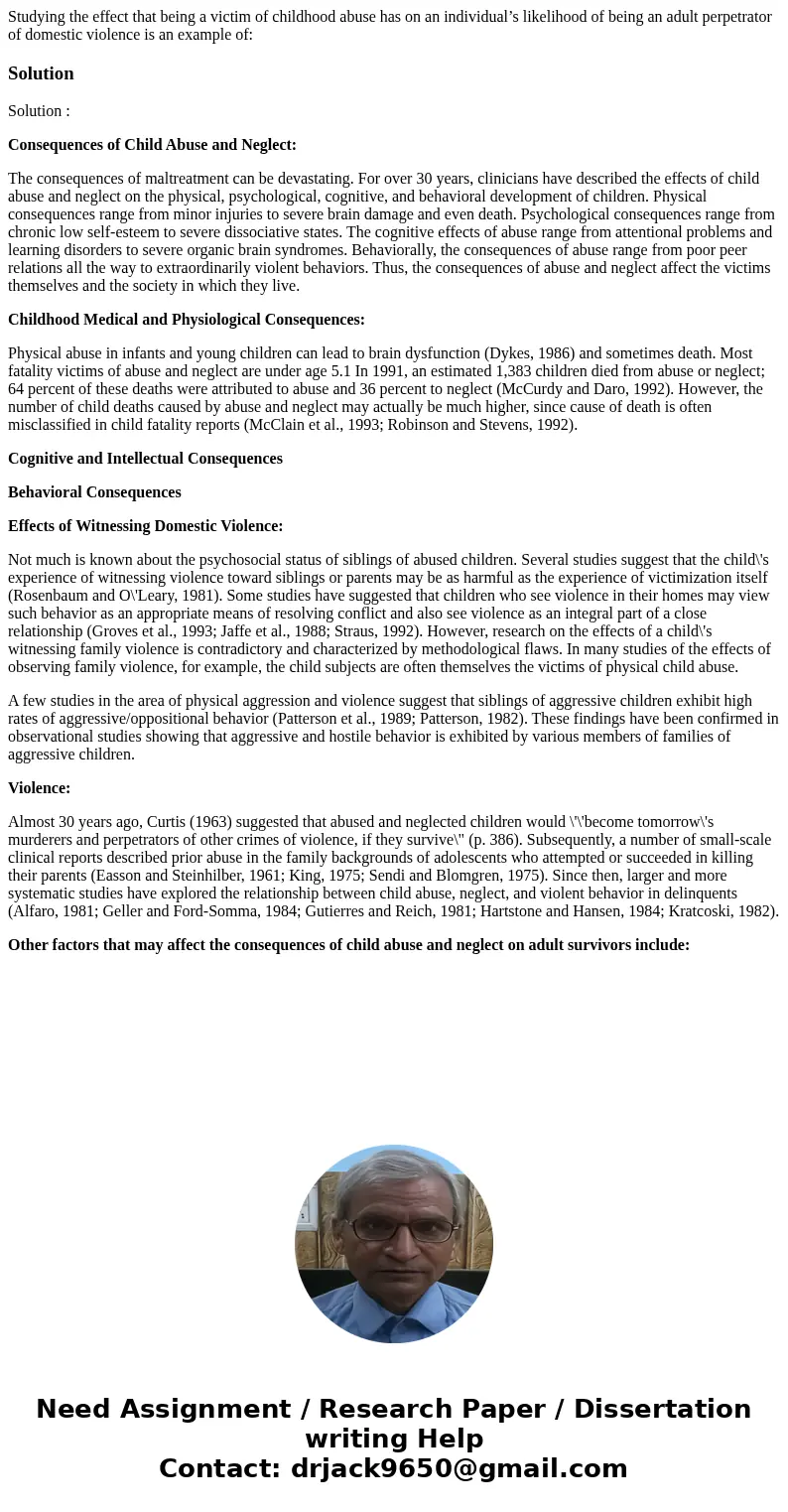Studying the effect that being a victim of childhood abuse h
Studying the effect that being a victim of childhood abuse has on an individual’s likelihood of being an adult perpetrator of domestic violence is an example of:
Solution
Solution :
Consequences of Child Abuse and Neglect:
The consequences of maltreatment can be devastating. For over 30 years, clinicians have described the effects of child abuse and neglect on the physical, psychological, cognitive, and behavioral development of children. Physical consequences range from minor injuries to severe brain damage and even death. Psychological consequences range from chronic low self-esteem to severe dissociative states. The cognitive effects of abuse range from attentional problems and learning disorders to severe organic brain syndromes. Behaviorally, the consequences of abuse range from poor peer relations all the way to extraordinarily violent behaviors. Thus, the consequences of abuse and neglect affect the victims themselves and the society in which they live.
Childhood Medical and Physiological Consequences:
Physical abuse in infants and young children can lead to brain dysfunction (Dykes, 1986) and sometimes death. Most fatality victims of abuse and neglect are under age 5.1 In 1991, an estimated 1,383 children died from abuse or neglect; 64 percent of these deaths were attributed to abuse and 36 percent to neglect (McCurdy and Daro, 1992). However, the number of child deaths caused by abuse and neglect may actually be much higher, since cause of death is often misclassified in child fatality reports (McClain et al., 1993; Robinson and Stevens, 1992).
Cognitive and Intellectual Consequences
Behavioral Consequences
Effects of Witnessing Domestic Violence:
Not much is known about the psychosocial status of siblings of abused children. Several studies suggest that the child\'s experience of witnessing violence toward siblings or parents may be as harmful as the experience of victimization itself (Rosenbaum and O\'Leary, 1981). Some studies have suggested that children who see violence in their homes may view such behavior as an appropriate means of resolving conflict and also see violence as an integral part of a close relationship (Groves et al., 1993; Jaffe et al., 1988; Straus, 1992). However, research on the effects of a child\'s witnessing family violence is contradictory and characterized by methodological flaws. In many studies of the effects of observing family violence, for example, the child subjects are often themselves the victims of physical child abuse.
A few studies in the area of physical aggression and violence suggest that siblings of aggressive children exhibit high rates of aggressive/oppositional behavior (Patterson et al., 1989; Patterson, 1982). These findings have been confirmed in observational studies showing that aggressive and hostile behavior is exhibited by various members of families of aggressive children.
Violence:
Almost 30 years ago, Curtis (1963) suggested that abused and neglected children would \'\'become tomorrow\'s murderers and perpetrators of other crimes of violence, if they survive\" (p. 386). Subsequently, a number of small-scale clinical reports described prior abuse in the family backgrounds of adolescents who attempted or succeeded in killing their parents (Easson and Steinhilber, 1961; King, 1975; Sendi and Blomgren, 1975). Since then, larger and more systematic studies have explored the relationship between child abuse, neglect, and violent behavior in delinquents (Alfaro, 1981; Geller and Ford-Somma, 1984; Gutierres and Reich, 1981; Hartstone and Hansen, 1984; Kratcoski, 1982).
Other factors that may affect the consequences of child abuse and neglect on adult survivors include:

 Homework Sourse
Homework Sourse